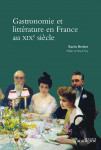
Gastronomie et litt ́erature en France au XIXe si`ecle. Par KARIN BECKER; pre ́face de PASCAL ORY. (Re ́fe ́rences, 26.) Orle ́ans: Paradigme, 2017. 191 pp.
Karin Becker’s study covers familiar ground, but does so in new ways, offering many fresh insights. Her corpus includes well-known, largely narrative works by Balzac, Baudelaire, Flaubert, Hugo, Zola, and Maupassant, analysed to explore ‘l’interaction entre gastronomie et litte ́rature en France au XIXe sie`cle’ (p. 9). Becker’s originality lies in the sceptical eye she casts upon gastronomic discourse and literature alike, and in her novel manner of conceptualizing the complex relationship between them. ‘Les e ́crits de gastronomes constituent un phe ́nome`ne ambivalent, car ils oscillent entre la volonte ́ de transmettre un savoir concret d’une part, et le plaisir de l’e ́vocation vague et suggestive d’autre part’, she contends (p. 16), refusing either to take this savoir at face value, or to fall naively under the spell of gastronomes’ lyrical incantations. To be sure, ‘les romanciers reprennent, dans de nombreuses sce`nes de repas, les topo ̈ı utilise ́s par les gastronomes’ (p. 17), and to some extent they do so in praise of the table, thus joining gastronomes in ‘la création de ce mythe culinaire, ce ́le ́bré en France et exporte ́ avec succe`s a` l’e ́tranger, ou` l’he ́ge ́monie de la cuisine franc ̧aise est peu souvent mise en question’ (p. 29). Yet realist and naturalist writers also use the period’s gastronomic commonplaces in subtler and more subversive ways: ‘la description de la culture gastronomique dans les romans repre ́sente, sous beaucoup d’aspects, une de ́construction ironique, sinon une critique de l’ide ́ologie en cours au XIXe sie`cle’ (pp. 27–28), and in this sense literary works offer ‘une contribution originale a` la discussion contemporaine sur l’art de la bonne che`re’ (p. 9). Becker’s rich reflection on gastronomy and literature is remarkable in its attention to detail, focusing on such neglected matters as table manners, the role of personal hygiene, and the problematic status of women as diners, or scrutinizing what specific ingredients and their preparations might tell us about the relative refinement of the characters who serve them. Hosts, she notes, are not always ‘a` la hauteur du culte des initie ́s’ and thus ‘la demi-mondaine Nana fait servir une selle de chevreuil “a` l’anglaise”, donc bouillie et non roˆtie; et sa poularde, un animal peu distinctif, est somptueusement pre ́pare ́ “a` la mare ́chale”’ (p. 32). She also has a keen eye for what’s missing from texts: in particular, given writers’ insistence on ‘la perspective du consommateur, du mangeur bourgeois,’ she observes how ‘le point de vue des producteurs, et notamment des cuisiniers, est entie`rement e ́carte ́ de la narration’ (p. 21). Certain readers might wish for a greater variety of texts to be examined along the way — perhaps some less canonical popular novels, plays, poems, or works by women writers like famously gourmande George Sand. Yet Becker delivers on what she promises, through incisive readings of a nicely coherent corpus. And, in the process, she transforms our vision of the gastronomic world represented within the nineteenth-century novel. We discover a feast for the mind, perhaps not the sumptuous banquet we might have fancied, yet all the more piquant for the critical perspectives we gain through Becker’s analysis.
MICHAEL D. GARVAL doi:10.1093/fs/knx273 NORTH CAROLINA STATE UNIVERSITY






